Venera Mikhailovna Chernyshova(March 5, 1954, Perm, RSFSR, USSR) - Soviet skier and biathlete, first world champion in biathlon, absolute winner of the first women's World Biathlon Championship 1984 in Chamonix (gold in sprint, individual and relay), a total of seven-time winner world championships, vice-champion in the sprint and two-time bronze medalist at the World Championships. The first biathlete to set an “eternal” record - three gold medals out of three at the World Championships. Honored Master of Sports of the USSR in biathlon. She ended her sports career in 1990. She was taken to the team, where she amazed eminent biathletes, international masters of sports, with her obsession.
When Chernysheva was included in the team to compete at the first world championship in women's biathlon history (1984), she did not believe her luck. Her teammates already had experience competing in international competitions - they had repeatedly brought medals from biathlete tournaments in the countries of the socialist commonwealth. For Venus, this was everything for the first time. At the 10-kilometer distance, Venus showed the best time. Some people said it was an accident. But when she also won in the 5-kilometer “sprint” race, no one talked about accidents anymore. And the real triumph of Venus was the victory as part of the team in the relay race. Venus Chernyshova’s star flashed with a bright light on the sports horizon in the small French town of Chamonix.
Elena Viktorovna Golovina
Soviet biathlete, ten-time world champion and two-time medalist of the world championships, winner of the World Cup. Honored Master of Sports of the USSR (1987). Elena Viktorovna was born on February 16, 1961, in the village of Komarovo, Bogdanovichsky district, Sverdlovsk region. She graduated from the Bogdanovich Mechanics and Ceramic College. She played for the USSR national team from 1985 to 1992. Her record for the number of gold medals at the world championships was repeated on March 13, 2011 by 24-year-old German biathlete Magdalena Neuner. True, in personal competitions, Elena Golovina was able to win only one gold medal. This happened at the 1987 World Championships in Finnish Lahti, where Golovina won the sprint race. In the 1988/1989 season she won the World Cup, and the next season she was just a little short of repeating this success - in the overall World Cup standings of the 1989 season. 1990 Elena Golovina took third place, losing only to Czechoslovakian biathlete Jiřina Adamičkova and Canadian biathlete Mirjam Bedar. Ten-time world champion, World Cup winner. Ten gold medals from world championships is an absolute record for women's biathlon. Yes, with the current wide range of races for every taste, he will soon be beaten. Yes, Golovina’s nine triumphs were relay and team, well, even in her human qualities she was a “relay athlete” and seemed embarrassed to be listed above her own partners in the protocols. So much so that she calls her only personal victory the most unexpected of all. At the 1987 World Cup in Lahti, Golovina had a sporting good fortune, like probably never again in the future. An ideal sprint with “zero” (an infrequent gift for her), then a “golden” relay race that had not yet become a duty - and Elena leapt to the top of biathlon. For all the remaining years, the Soviet troika (invariably together with Golovin) was first by default. Every year, awards in the same quantity came to her account; along the long cup distance, Elena also moved steadily and time after time settled either on the first line of the total, or somewhere close, but alone at major tournaments it just didn’t work out. In 1992, women's biathlon made its debut at the Olympics, and there the Russian woman, who was going to France, obviously not to look at the beauty, suddenly broke down. The words “sports tragedy” and “catastrophe” are not very appropriate in relation to ten-time champions, but they will certainly have their own drama. In the sprint and individual, Golovina collapsed somewhere deep in the peloton, after which she voluntarily abandoned the relay so as not to let down what is sacred - the team. Elena herself is inclined to believe that in that fatal season the national team coaches were too clever with their preparation, although her compatriots who performed brilliantly can argue with this hypothesis. Years later, the Russian woman honestly admits that she was not ready for such a deep failure
Anfisa Anatolyevna Reztsova(nee - Romanova;December 16, 1964, village. Yakimets, Gus-Khrustalny district, Vladimir region) - Soviet and Russian biathlete and skier, two-time Olympic champion in biathlon, Olympic champion in cross-country skiing, three-time world champion in cross-country skiing, two-time winner of the Biathlon World Cup. The only female athlete in the world is an Olympic champion in two winter sports at once. The first Olympic champion in this event in the history of world biathlon
Anfisa Reztsova is known in the world as one of the best racers, and of a wide range. At the Olympic Calgary-88 on the slopes of the Canadian ski center, Canmore won as part of the relay ski team. And at the longest distance - 20 km - she won a silver medal.
After Calgary, the Olympic champion became a mother and changed her skiing role in the four years between the games. At the Olympic Games Albertville (1992) she became a prima in biathlon. Gold award in biathlon at a distance of 7.5 km and bronze in the relay race.
At the next games in Lillehammer (1994), she again became the Olympic champion in the biathlon relay. Anfisa competed in the final stage, did not miss a single shot at the shooting range and reached the finish line 3 minutes 57 seconds faster than her competitor in the stage Petra Schaaf (Germany)
Galina Alekseevna Kukleva
The story of athlete Galina Kukleva begins in 1983. It was then that she began skiing with coach V.P. Povozhilov. Galina's transition to biathlon dates back to 1988. And already in 1990, Kukleva had her first successes: she became a member of the USSR national team and became a master of sports. And in 1991, she competed at the World Youth Championships and won gold in the relay race. In 1993, after the tragic death of her coach, Galina Kukleva changed her place of residence and moved to Tyumen. There Galina began training in the group of Guryev L.A. In 1996, Galina Kukleva became the European champion, and in 1997 she won the World Cup and won the World Cup. Total victories at the World Cup stages are 9. At the 1998 Olympic Games in Nagano, Galina Kukleva became the Olympic champion. Galina was the best in the 7.5 km sprint. Kukleva also won a silver medal as part of the Russian relay. At the next Olympic Games, which were held in Salt Lake City, Kukleva became a bronze medalist in the relay. Among the world championship awards, Galina Kukleva has: three gold, two silver and bronze. At the end of the 2002/2003 season, Kukleva announced her retirement from professional sports.
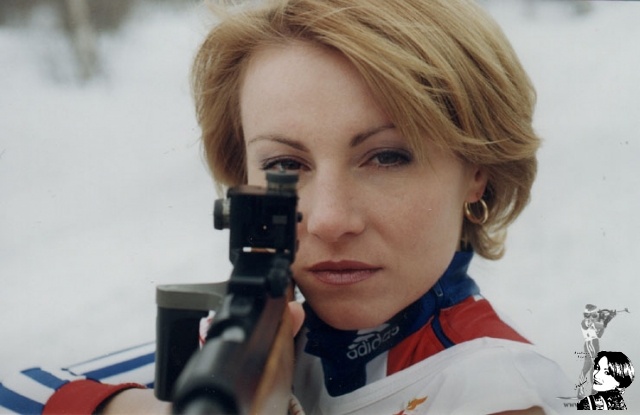
Albina Akhatova:
She made her debut in the World Cup on January 13, 1996 - in the sprint race (held as part of the 3rd stage of the 1995-1996 World Cup) in Anterselva, Italy, showing the 56th result (and the last among Russian athletes).
For the first time, she entered the top 30 (points group) in a World Cup race on December 11, 1997 - in the individual race (held as part of the 2nd stage of the 1997-1998 World Cup) in Östersund, Sweden, showing 17th result.
She reached the podium for the first time in a World Cup race on December 16, 1998 - in the individual race (held as part of the 2nd stage of the 1997-1998 World Cup) in Brezno, Slovakia, showing 2nd result.
She won her first victory in a World Cup race on January 26, 2003 - in the Mass Start (held as part of the 6th stage of the 2002-2003 World Cup) in Anterselva, Italy.
In relay racing, Albina Akhatova won a silver medal at the 1998 Winter Olympics in Nagano, a bronze medal at the 2002 Winter Olympics in Salt Lake City and gold at the 2006 Winter Olympics in Turin. At the same time, Albina Akhatova became a bronze medalist in the 15 km individual race, after Olga Pyleva’s medal was confiscated for doping. She won her second bronze medal in the 10 km pursuit race.
At the World Championships in Khanty-Mansiysk in 2003, Albina won a gold medal in the mass start, also a bronze medal at the 1999 Biathlon World Championships in Oslo and a silver medal at a distance of 15 km at the 2004 Biathlon World Championships in Oberhof. She won gold medals in the team sprint in 1998 and in the relay in 2000 and 2003; silver medalist in relay races in 1999 and 2004. Thus, at the moment Albina Akhatova is one of the most titled active athletes of the Russian biathlon team, having 10 world championship medals (4 gold) and 5 Olympic medals (1 gold).
Second prize-winner of the 2002/03 World Cup in the overall standings, in the same season the athlete won the small crystal globe in the mass start race. She missed the 2006/07 season due to the birth of a child. On December 24, 2006, their son Leonid was born.
In the 2007-2008 season, she returned to professional sports and won two medals at the 2008 World Championships. Even at this championship, Albina suffered an unfortunate setback in the relay race: the firing pin of her rifle failed, which is why the team lost about two minutes and did not get into the prizes. At the last stage, Ekaterina Yuryeva tried to win at least bronze for the team, but, being completely exhausted from making up for lost minutes, she lost to the Frenchwoman Sandrine Bailly at the finish line.
Svetlana Vladimirovna Pecherskaya(nee Davydova; November 14, 1968, Smolino village, Sverdlovsk region) - Soviet and Russian biathlete, silver medalist of the 1992 Olympic Games in the individual race, seven-time world champion, multiple medalist of the world championships, winner of the World Cup of the 1990/1991 season. Honored Master of Sports of the USSR (1990).
ISHMURATOVA SVETLANA IREKOVNA
For a long time, Russian fans considered Svetlana Ishmuratova simply unlucky. A bright, talented athlete, an excellent skier and a reliable shooter, she has been a constant member of the Russian national team since 1996 - and could not win at the World Cup stages. She has long been recognized as an irreplaceable, reliable relay runner, and in relay races she and her team have more than once climbed to the highest step of the podium. But in personal races it didn’t work out.
Over the course of her entire career, Svetlana had thirteen second places at stages, nine third places, but she never had a victory. Until the very last season. Before the Turin Olympics season.
The breakthrough for Svetlana was the individual race at the KM stage in Slovakia at the end of 2005 - there Ishmuratova won for the first time in the individual discipline at the World Cup. She won as convincingly as if she hit the table with her fist - with only a one-minute penalty and with an almost minute advantage over A. Akhatova, who then took second place. And a couple of months later, this victorious success was repeated at the Olympic Games in Turin, and also precisely in the individual race and with only one miss. A few days later, Svetlana’s first Olympic gold was added to the second - in the relay race, where Ishmuratova competed in the second stage and won - together with A. Bogaliy-Titovets, O. Zaitseva and A. Akhatova. The 2005-2006 season was the last in Svetlana’s sports career.
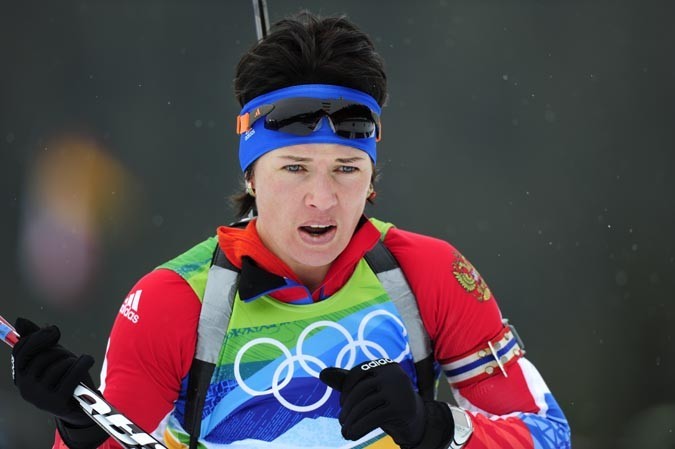
Olga Medvedtseva (Pyleva, Zamorozova)
born on July 7, 1975 in Borodino, Krasnoyarsk Territory, height - 163 cm, weight - 55 kg, in biathlon - since 1998. title - master of sports in biathlon (since 1999), honored master of sports in biathlon (since 2000), holder of the Order of Sports Glory Russia" III degree Order “For Services to the Fatherland” IV degree. - 2 gold medals of the 2002 Olympic Games in the pursuit, and in the relay in 2010 - silver medalist of the 2002 Olympics in the relay - Silver medalist of the World Championships in mass start (Holmenkollen, 2002) - Gold medal at the 2004 World Championship in the individual race (Oberhof, 2004) - 4-time world champion in the relay race (2000 (Oslo Holmenkollen), 2001 (Pokljuka), 2005 (Hochfilzen), 2009 (Pyeongchang)) and vice - champion in 2004 (Oberhof). - Silver medalist of the World Championships in relay (Hochfilzen, 2006). - Silver medalist of the World Championships in mass start (Oberhof, 2006). - Bronze in mass start in 2005 (Hochfilzen) - 2 -x multiple winner of the World Cup in the individual races. At the 2006 Olympic Games she won a silver medal in the 15 km individual race. However, two days later, both doping tests taken from Pyleva turned out to be positive, revealing an increased concentration of the banned drug phenotropil. As a result of this, Pyleva’s silver medal went to the German Martina Glagov, and Albina Akhatova became the bronze medalist. Pyleva was suspended from all subsequent Olympic competitions and disqualified for two years. At the end of the 2007-2008 season, Olga, who took the surname of her husband and coach Valery Medvedtsev, again began competing in competitions within Russia. And in the new season 2008-2009, Olga Medvedtseva returned to the main team of the Russian National Biathlon Team. After the end of the 2009-2010 season, Olga Medvedtseva decided to end her career.
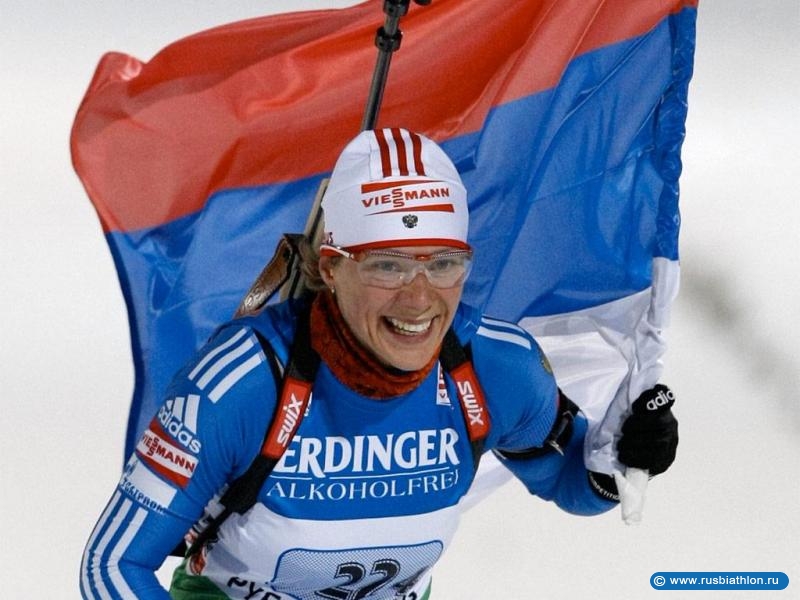
Olga Zaitseva —
- Two-time Olympic champion in relay (2006, 2010).
- Silver in the mass start at the 2010 Winter Olympics in Vancouver.
- Three-time world champion: in the relay (2005, 2009) and mass start ( 2009 ).
- She also has 2 silver and three bronze medals at the world championships.
- The best result in the overall World Cup standings was 4th place in 2005.
- Won 13 World Cup stages in individual races.
long-time leader of the Russian biathlon team. She was born and raised in Moscow, and began her career as a biathlete quite late and, one might say, completely by accident. Zaitseva's first start at the world level took place in 2001, and already in 2002 she made her debut at the Olympic Games in Salt Lake City. Olga missed the 2006/2007 and 2007/2008 seasons for family reasons - the athlete was on maternity leave for the birth of her son Alexander for her husband Milan Augustin. And in the first season after returning to the Russian biathlon team, she took sixth place in the overall World Cup standings. In recent years, Olga Zaitseva’s clear ace in the hole is accurate shooting. She is one of the most consistent shooters in world biathlon, although she periodically “shoots” in terms of speed, demonstrating a powerful move. However, if Zaitseva’s shooting doesn’t go well, she doesn’t have much chance of getting on the podium.




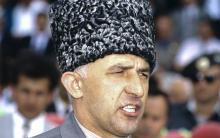

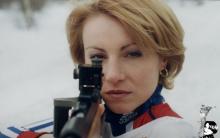




The most beautiful motorcycles in the world
Which sea is the cleanest in the world?
Top 10 Most Expensive Furs
The largest and most luxurious casinos in the world
Knightly orders of Europe XI - XIII centuries